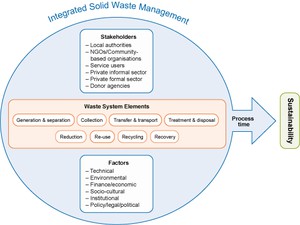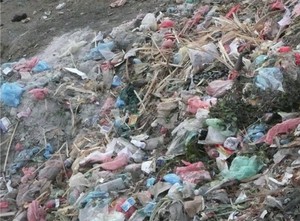An ISWM system is more than just the 3 Rs. It has three components: the waste system elements; the stakeholders; and the influencing factors. These three components are shown in Figure 11.3. The waste system elements are the stages in the waste management chain that have been discussed in previous study sessions. In ISWM, every stage in the chain should be guided by strategies to minimise the waste that reaches the disposal site, to protect the environment and where possible to generate income from waste. The stakeholders are the people and organisations involved and the influencing factors are other aspects that need to be considered when developing an ISWM system. Stakeholders and the influencing factors are described below.

Figure 11.3 The integrated solid waste management model. (Adapted from Van de Klundert and Anschütz, 2001)
The term stakeholder refers to any individual or organisation that has a stake or an interest in a programme or activity or is affected by the activity. When it comes to the management of a kebele’s waste, who are the stakeholders? Everybody who lives or works in the kebele is a stakeholder. So are people who visit the kebele for any reason (perhaps relations of residents). The organisations in the kebele are also stakeholders (businesses, commerce, government etc.). If a private sector organisation is involved in providing the service, it too is a stakeholder. The organisations that provide any funding for the ISWM (local and national government, NGOs, aid agencies) are also stakeholders. This is such a wide group because every person, institution, organisation and industry in the kebele generates waste and is affected by the way it is collected, treated and disposed of.
Waste management requires a concerted effort throughout the process of its management and the degree of involvement of stakeholders varies from place to place. So it is necessary to identify stakeholders and their areas of interest and degrees of involvement in waste management (e.g. funding, training, waste collection, recycling etc.).
List the stakeholders in waste management in your home village, town or city.
Your list will depend on where you live but could include:
One of the main challenges of ISWM is coordinating the stakeholders and getting them to work together for a common goal. So those working in waste management need to be able to work with the various stakeholders and help them to agree the way forward. Participation by the community members in planning and decision making is especially important because their cooperation and a positive attitude to recycling and reuse will be essential.
Several factors will influence the selection, operation and effectiveness of any waste management scheme and need to be considered when planning a successful ISWM programme. They include:

Figure 11.4 Open dumping causes environmental pollution and is a risk to health.